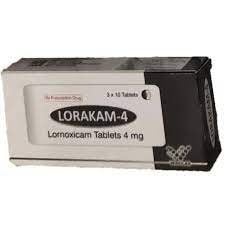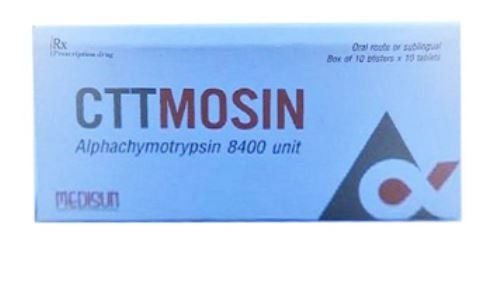This is an automatically translated article.
Diclovat medicine in the form of rectal tablets containing the active ingredient Diclofenac is indicated in diseases of arthritis, bursitis, tendonitis, low back pain, migraine... Let's learn about the uses and Notes when using Diclovat through the article below.
1. Uses of Diclovat
Diclovat 100mg medicine contains the active ingredient Diclofenac sodium 100mg, which is prepared in the form of rectal tablets. Diclofenac belongs to the group of non-steroidal anti-inflammatory drugs (NSAIDs) with antipyretic, analgesic, and anti-inflammatory effects. The drug works by inhibiting the biosynthesis of Prostaglandins - compounds that play an important role in inflammation, pain and fever. Diclofenac has been shown to have a strong analgesic effect in moderate to severe pain.
Diclovat medicine is indicated in the following cases:
Inflammation, swelling, pain and degeneration of joints in bone and joint diseases such as spondylitis, polyarthritis, osteoarthritis, spinal pain syndrome, arthritis vertebrae, extra-articular rheumatism; Acute Gout ; Relieve pain and inflammation in gynecology such as adnexitis, dysmenorrhea...; Reduce inflammation, swelling and pain after surgery or trauma such as orthopedic surgery, dental surgery.
2. Dosage of the drug Diclovat
Diclofenac rectal is usually indicated in patients who cannot be taken orally (coma, elderly, recent surgery). The dose of Diclovat is prescribed by the treating doctor based on the medical condition. Some recommendations on the dose of Diclovat are as follows:Adults and children 12 years of age and older: Put 1 tablet/time x 1 time/day; In case of severe pain, the dose can be increased to a maximum of 2 tablets per day. How to use Diclovat 100mg suppository as follows:
Before use should put the tablet in the refrigerator for about 20-30 minutes; Take out the tablet and dip it in cold water to moisten; The patient lies down, brings the knee up and places the tablet deep into the rectum; Remain in the same position after placing the medicine for several minutes; After taking the drug, the patient should refrain from going to the toilet for 1 hour for the drug to have full therapeutic effect.
3. Diclovat side effects
Diclovat 100mg medicine can cause some unwanted effects as follows:
Anorexia, flatulence, epigastric pain; Abdominal pain, vomiting, diarrhea; Dizziness, headache, lightheadedness, fatigue; Allergic skin reactions, dermatitis, rash, urticaria; Bloody stools, gastrointestinal bleeding; Hypotension, bronchial asthma, anaphylaxis... Patients need to stop using the drug and notify the doctor in case of any unwanted effects while taking Diclovat.
4. Notes when using Diclovat
4.1. Contraindications Contraindicated to use Diclovat drug in the following cases:
Patients with hypersensitivity to Diclofenac or to any ingredient of Diclovat drug; Patients with advanced peptic ulcer disease; Patients with a history of gastric bleeding; Patients with a history of bronchial asthma, allergic rhinitis or urticaria caused by the use of other NSAIDs; Women who are pregnant in the last 3 months of pregnancy; Children under 12 years old. 4.2. Precautions for use Diclovat should be used with caution in patients with a history of bleeding or perforation of the gastrointestinal tract, in patients with impaired liver or kidney function or with lupus erythematosus. Use caution when treating patients with high blood pressure, patients with heart disease with symptoms of edema, patients with a history of blood clotting disorders. During treatment with Diclovat, patients should absolutely follow the doctor's instructions on the dose and duration of taking the drug, do not increase or decrease the dose of the drug arbitrarily. For pregnant women: Do not use Diclovat rectally in women who are pregnant in the last 3 months of pregnancy, in the remaining stages, it is recommended not to use when not really needed. Because the use of prostaglandin inhibitors can lead to adverse effects on the fetus such as damage to fetal kidney function, prolong pregnancy, inhibit uterine contractions, increase the risk of bleeding in both mother and fetus, increasing the risk of maternal edema. For women who are breast-feeding: Diclovat is not excreted in breast milk, so it can be used in lactating women with appropriate doses.
5. Drug interactions
Diclovat may cause the following drug interactions:
Do not use Diclovat concurrently with other non-steroidal anti-inflammatory drugs (NSAIDs) due to the risk of ulceration and gastrointestinal bleeding; Oral anticoagulants (heparin), warfarin, ticlopidine: Increased risk of bleeding; Diclovat may increase blood levels of Digoxine and Lithium; Concomitant use of Diclovat and potassium-sparing diuretics increases serum potassium levels; Diclovat and non-steroidal anti-inflammatory drugs increase the plasma concentration of Methotrexate , so these drugs should not be used concurrently; The nephrotoxicity of Cyclosporin is increased when used with Diclovat. Drug interactions can occur that reduce the effectiveness of treatment and increase the risk of unwanted effects of Diclovat. Therefore, to ensure the safety and effectiveness of treatment, patients need to inform their doctors about the drugs they are using before treatment with Diclovat.
Follow Vinmec International General Hospital website to get more health, nutrition and beauty information to protect the health of yourself and your loved ones in your family.
Please dial HOTLINE for more information or register for an appointment HERE. Download MyVinmec app to make appointments faster and to manage your bookings easily.













